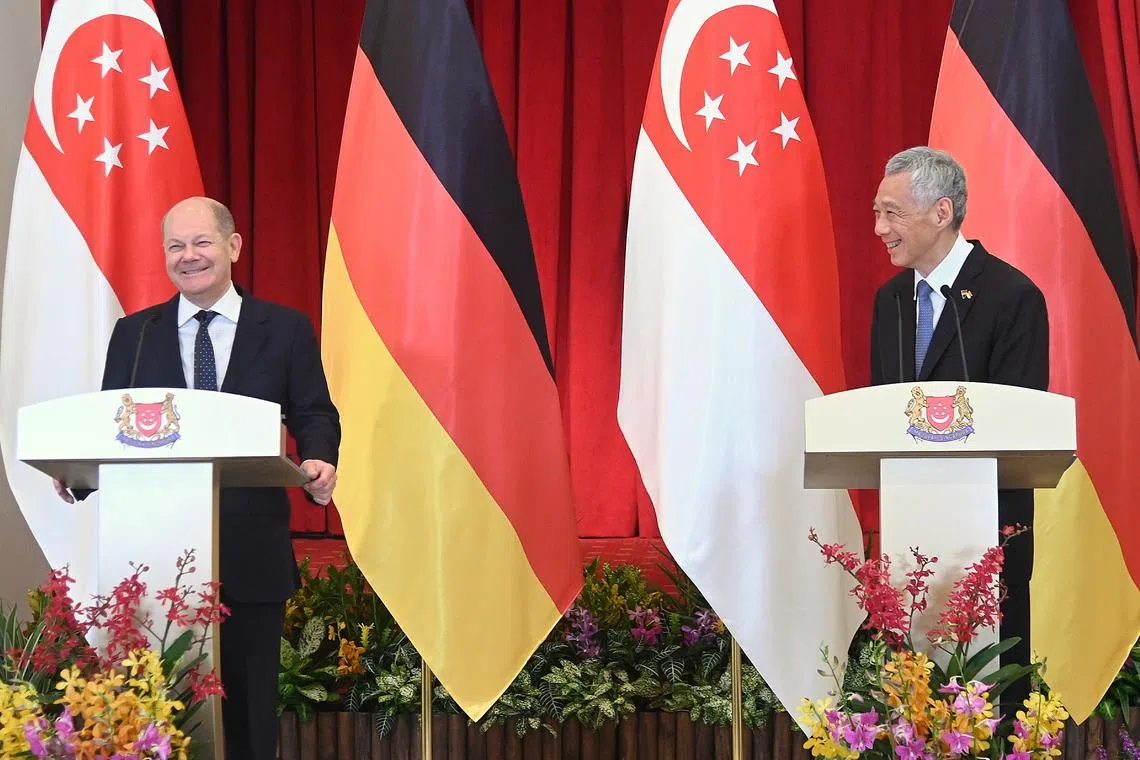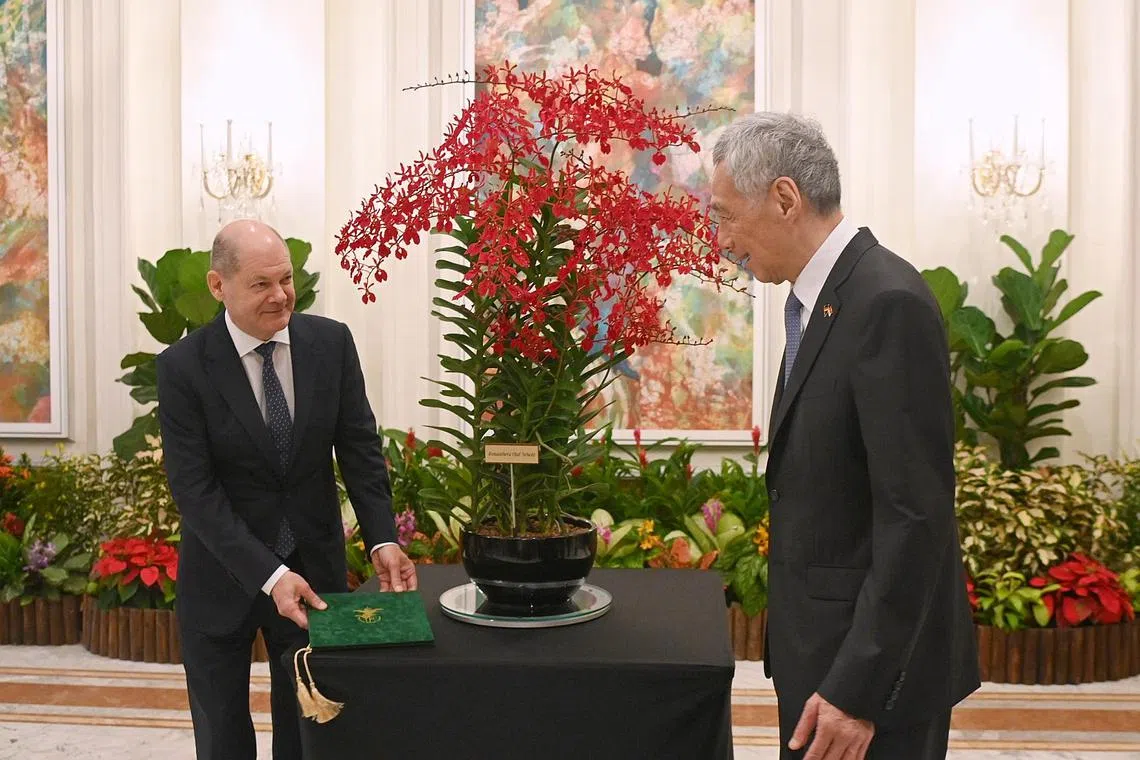Germany and Singapore to deepen collaboration, including in climate action and defence
Sign up now: Get ST's newsletters delivered to your inbox

German Chancellor Olaf Scholz and Prime Minister Lee Hsien Loong said the two countries will bolster their partnership in the face of global challenges such as climate change, great power rivalry and supply chain disruptions.
ST PHOTO: DESMOND WEE
SINGAPORE - Prime Minister Lee Hsien Loong and visiting German Chancellor Olaf Scholz agreed on Monday to deepen collaboration between their two countries through a renewed road map to strengthen the bilateral partnership.
Areas for collaboration include traditional fields such as defence, education and the economy, and newer ones such as renewable energy and climate action.
The two leaders issued a joint declaration after their meeting that said Singapore and Germany will bolster their partnership in the face of global challenges such as climate change, great power rivalry and supply chain disruptions.
“Germany and Singapore will further strengthen our partnership with shared determination and ambition to chart a future based on sustainability, innovation, and resilience,” said the two countries.
At a joint press conference after their meeting, PM Lee said economic links stayed strong throughout the Covid-19 pandemic, and both countries worked closely to ensure the availability of vaccines.
Defence ties are also warm and growing, he noted.
“Chancellor Scholz and I agreed to grow our relations further,” he said, describing the new joint declaration as a comprehensive blueprint for new and emerging areas of cooperation.
PM Lee added that he would be visiting the German port city of Kiel in December for the launch of two Republic of Singapore Navy submarines.
Mr Scholz said: “The relations between Singapore and Germany are close, and we both aim to deepen them further. Prime Minister Lee and I agreed to do this today. And I’m delighted that in Singapore, Germany has such a reliable partner in the region.”
The crises of the times – from climate change to the war in Ukraine – are a clear illustration of the fact that there is no power in the world that can tackle these challenges single-handedly, he added.
“The world is becoming multipolar. We all need partners, we all rely on multilateral cooperation and we need a stable multilateral international order,” said Mr Scholz.
Mr Scholz is in Singapore for a one-day visit,
During his visit on Monday, he also called on President Halimah Yacob.
In a Facebook post, Madam Halimah said she had a good discussion with Mr Scholz on various topics such as digitalisation, the state of US-China relations, the upcoming Group of 20 Summit, as well as the war in Ukraine.
PM Lee said that he had discussed regional and global issues such as the Russia-Ukraine war
Both countries staunchly support international law and the UN Charter,
“Like-minded partners such as Singapore and Germany need to work closely together on the common challenges confronting Asia and Europe,” he said.
The countries will continue to act within the framework of multilateralism to uphold and strengthen a rules-based international order and promote peace, stability and cooperation, and maintain free trade, he said.
Noting that German companies have had a long history here – such as technology company Siemens, which has been in Singapore for more than 100 years – PM Lee said he hoped that new companies setting up here like vaccine firm BioNTech would also stay for a long time.
“So, if we can continue that depth and that consistency, whatever happens up and down in the region and in the world, then this mutual cooperation will deliver benefits for both sides for a long time to come,” he added.
The new joint declaration is preceded by the Joint Declaration on Enhanced Partnership in 1998 and the Singapore-Germany Declaration in 2005.
It laid out areas of collaboration such as supporting ongoing negotiations for an ambitious and comprehensive European Union-Singapore Digital Partnership, and undertaking joint initiatives and facilitating knowledge exchange in the areas of urban governance, energy efficiency and renewable energies.
An orchid was also named in Mr Scholz’s honour at the Istana on Monday. In the evening, Mr Scholz was hosted to an official dinner by PM Lee.

German Chancellor Olaf Scholz with PM Lee Hsien Loong at the orchid-naming ceremony at the Istana on Nov 14, 2022.
ST PHOTO: DESMOND WEE
Germany is Singapore’s largest goods trade partner in the EU, with trade between both countries totalling $23.4 billion in 2021. This accounted for about 23 per cent of Singapore’s total goods traded with the EU.
During his visit, Mr Scholz also delivered a keynote address at the 17th Asia-Pacific Conference for German Business, held at Raffles City Convention Centre.
The conference, held every two years, aims to deepen economic and political ties between the Asia Pacific and Germany.
On Sunday, Minister-in-charge of Trade Relations S. Iswaran and German Vice-Chancellor and Minister for Economic Affairs and Climate Action Robert Habeck signed the German-Singapore Framework for Sustainability and Innovation.
The framework will promote private sector-led collaborations across sectors such as advanced manufacturing, mobility and green technologies while facilitating cooperation in areas such as business matching, network and workplace training, Singapore’s Ministry of Trade and Industry said in a statement.
Here are some areas for collaboration that Monday’s joint declaration covers:
Political relations
- Enhance dialogue on global challenges, issues of mutual interest, and areas for cooperation, including multilateral affairs, peace and security and human rights.
- Deepen linkages between parliamentary friendship groups.
Economic cooperation
- Support ongoing negotiations for an ambitious and comprehensive EU-Singapore Digital Partnership.
- Enhance business and co-innovation partnerships in sectors such as renewable energy, agrifood technology and info communication technology.
- Enhance cooperation in infrastructure projects, in particular in renewable energy and low-carbon technology.
- Support the expansion of start-ups and small- to medium-sized enterprises in both countries and their respective regions.
Climate action and sustainability
- Deepen sustainability and green economy cooperation, create jobs in green sectors.
- Undertake joint initiatives and knowledge exchange in urban governance, energy efficiency and renewable energies.
Defence and security
- Maintain and intensify the frequent exchange of visits at the policy, military, and police levels.
- Expand cooperation on non-traditional security threats, including through counter-terrorism, maritime security, and humanitarian assistance and disaster relief.
Cybersecurity
- Increase cooperation between cybersecurity agencies and defence establishments.
- Enhance cooperation between law enforcement agencies to combat financial fraud and online scams.
Education, research, science and technology
- Collaborate and exchange talent in research and development.
- Explore collaboration in new materials and methods for additive manufacturing, robust security systems for the industrial Internet of Things, and future communication technologies.
- Explore collaboration in life sciences with a focus on digital health, pandemic preparedness and food security research.
- Support exchanges and cooperation between schools, vocational institutions, universities, and research institutes.



